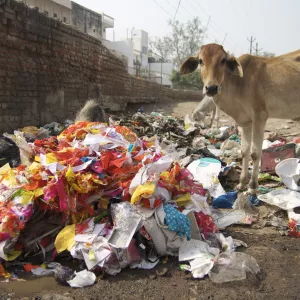World Environment Day 2025: Tackling the Global Plastic Crisis to Regenerate Our Food Systems
Photo credit: Calf with trash; Vrindavan, India. Apercoco Since 1974, World Environment Day has mobilized global efforts to protect our planet, highlighting urgent environmental challenges and driving collective action. On June 5, 2025, the Republic of Korea will host the event, rallying the international community around a critical mission: to #BeatPlasticPollution. Plastic pollution has become one of the defining environmental

World Environment Day 2025: Tackling the Global Plastic Crisis to Regenerate Our Food Systems
Photo credit: Calf with trash; Vrindavan, India. Apercoco
Since 1974, World Environment Day has mobilized global efforts to protect our planet, highlighting urgent environmental challenges and driving collective action. On June 5, 2025, the Republic of Korea will host the event, rallying the international community around a critical mission: to #BeatPlasticPollution.
Plastic pollution has become one of the defining environmental crises of our era. Every year, the world generates nearly 400 million tonnes of plastic waste, of which more than 8 million tonnes end up in our oceans, devastating marine life.
While a significant portion is either incinerated or sent to landfills, less than 10% is recycled. More than 8 million tonnes of this waste end up in our oceans, devastating marine life, contaminating food systems, and posing a threat to human health. A transition to a circular bioeconomy is crucial for addressing this escalating global crisis.

Photo credit: Plastic pollutants collected by Blue Guards. Md. Asaduzzaman.
A plastic-free food future through community and policy action
In this critical context, CGIAR and its partners are developing innovative, sustainable approaches that harness biological resources to create eco-friendly alternatives and minimize plastic use.
IFPRI’s research warns that plastic pollution poses a growing threat to food security and public health, advocating for strategies such as banning unnecessary single-use plastics, promoting reusable alternatives, and holding producers accountable through circular economy policies.
One promising example of such an alternative comes from Thailand, where researchers from the Alliance of Bioversity and CIAT developed biodegradable films from cassava starch, which fully degrade in soil within 12 weeks—a promising alternative to fossil-based plastics.

Photo credit: Women in Manyatta, Kenya, celebrate high-quality briquettes made from organic material as part of NATURE+ circular bioeconomy activities.
Further demonstrating practical circular solutions, in collaboration with partners such as the BAIF Development Research Foundation, CGIAR has established a Circular Bioeconomy Innovation Hub (CBE-IH) in India.
This hub focuses on transforming biodegradable waste into valuable resources, training over 400 individuals, including youth and women entrepreneurs, and introducing sustainable practices such as biogas units and biochar production to reduce pollution and create new income opportunities.
Beyond technological innovations, behavioral shifts are also crucial. To foster these, CGIAR has trained over 5,000 individuals from South Asia on reuse, repair, and plastic-free livelihoods.
At a household level, a comparison between an €8 organic bar soap and a 40-cent plastic-bottled liquid soap highlighted the challenges of reducing plastic waste and promoting sustainable consumption in an equitable manner.
While individual and community-level initiatives are vital, significant investment from the private sector is also crucial for broader impact. A coalition of 30 global companies has pledged over USD 1 billion through the Alliance to End Plastic Waste to tackle ocean plastic pollution, marking one of the largest private-sector efforts to date.

Photo credit: Rubbish on the beach, JB
Microplastics: An invisible threat to aquatic food safety
Beyond visible pollution, microplastics—tiny particles less than five millimeters in size—have quietly infiltrated aquatic ecosystems and, subsequently, our food system.
Research from CGIAR’s WorldFish and partners found high levels of microplastics in dried fish, a major food source in Bangladesh, raising serious concerns about food safety and potential human health risks. Addressing the issue requires a systemic shift.
In Kenya, CGIAR’s organic waste recycling initiatives transform food byproducts into valuable agricultural inputs like compost to restore nutrients to farms, reduce pollution, and support a more sustainable food future. Nairobi’s young entrepreneurs are similarly turning food waste into sustainable agricultural inputs.
Our collective path forward
To secure our food systems and protect public health, we need coordinated efforts at every level—from supporting local community cleanups and sustainable practices to urging policymakers to adopt robust plastic management frameworks. Only then can we effectively tackle this growing threat.
Join the movement for a cleaner planet! You can support the #BeatPlasticPollution campaign by sharing your story on social media and tagging @CGIAR and @UNEP. Explore the World Environment Day portal for events and advocate for your government to adopt UNEP’s Law & Plastics Toolkit for more robust legislation.
Through a powerful combination of innovative science and strong community collaboration, CGIAR is committed to reducing plastic pollution, regenerating ecosystems, and ensuring a healthier planet for future generations.
Written by Camilla Palermo

